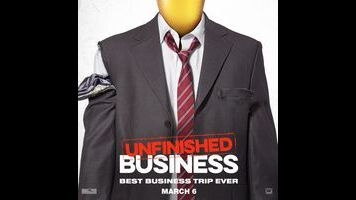Vaughn puts one foot back into raunchy comedy with Unfinished Business, but the movie’s forays into R-rated territory feel both cautious and perfunctory—maybe because his character, Dan Trunkman, is a caring family man and boss, too fatherly and goodhearted to indulge much of Vaughn’s trademark motormouthed riffing. (He gets one sorta-funny monologue in a European sauna.) Instead, little moments of barely comic sourness slip through as he realizes that the three-man mineral sales firm he’s started with old guy Timothy (Tom Wilkinson) and inexperienced young guy Mike (Dave Franco) might not have the goods to compete with his cutthroat former boss, Chuck (Sienna Miller), for the business of a particularly important client. Vaughn’s team winds up in Berlin, scrambling for face time with company men played by Nick Frost and James Marsden.
Forming rollicking bonds with Wilkinson and Franco ought to come easily to Vaughn; forced camaraderie is built into his shtick. But the three capable actors struggle to create the impression that they’ve known each other for more than a few weeks, even though the big business trip takes place after they’ve spent a year as their company’s only employees. Wilkinson’s Timothy comes off more morose than funny, and while Franco gets some laughs as the Brick Tamland-ish naïf of the group, the conditions of his sweet stupidity are even more mush-mouthed than his delivery—the movie wants to spring his lack of business qualifications as a comic surprise without risking any meanness.
That low-risk, low-reward strategy will be familiar to anyone who saw Delivery Man, the previous collaboration between Vaughn and director Ken Scott. While Unfinished Business has way more swearing and nudity piled on as would-be spice, its squishy, undercooked texture remains the same. This would matter less if the filmmakers delivered a few memorable comic set pieces. But the comedy-heart balance doesn’t match the best work of credited screenwriter Steve Conrad, who has penned midlife crises both sharply funny (The Weather Man, The Promotion) and Hollywood maudlin (The Secret Life Of Walter Mitty), possibly because Scott’s direction has no snap. Throughout the movie, he rushes through setups and jumps into gags too quickly; when Dan makes a wrong turn into traffic on a one-way street, the camera starts drifting away before the already-weak punchline lands. Even when the movie heads into its obligatory montage of debauchery, in which the comedy depends on visual surprises with as little setup as possible, Scott can only manage one or two funny cuts out of a few dozen.
When the movie takes time to actually run (not just repeat) a gag, it sometimes pays off, most notably in an amusingly strange bit about Vaughn staying in a hotel room that’s actually a German art installation. Mostly, though, Unfinished Business is notable for what it doesn’t do: It doesn’t give Dan’s business a dream-job sheen; it doesn’t portray Dan’s wife as a humorless nag; it doesn’t score too many points against ruthless businesswoman Miller. It also doesn’t give Miller or Marsden characters to play, and it treats Dan’s kids as emotional checkpoints. Like several of Vaughn’s most recent comedies, this one concerns itself with keeping its heart in the “right” place—i.e., a safe distance from the unsavory business of laughter.














![HBO teases new Euphoria, Larry David, and much more in 2026 sizzle reel [Updated]](https://img.pastemagazine.com/wp-content/avuploads/2025/12/12100344/MixCollage-12-Dec-2025-09-56-AM-9137.jpg)


























